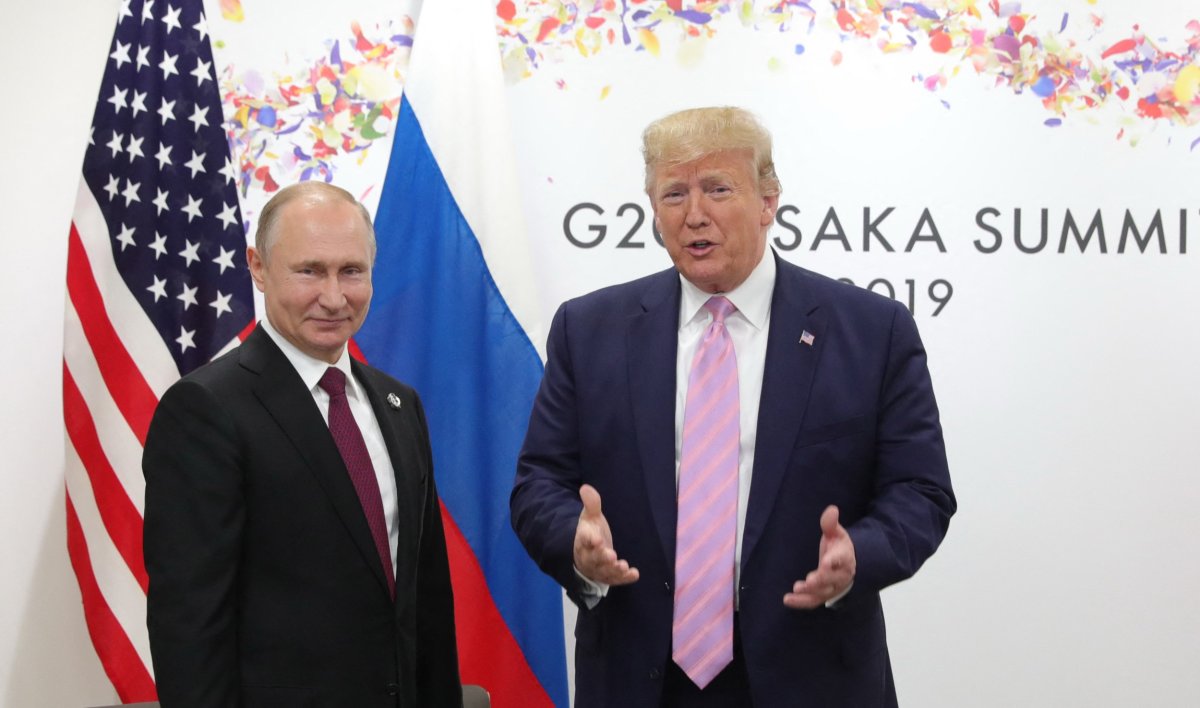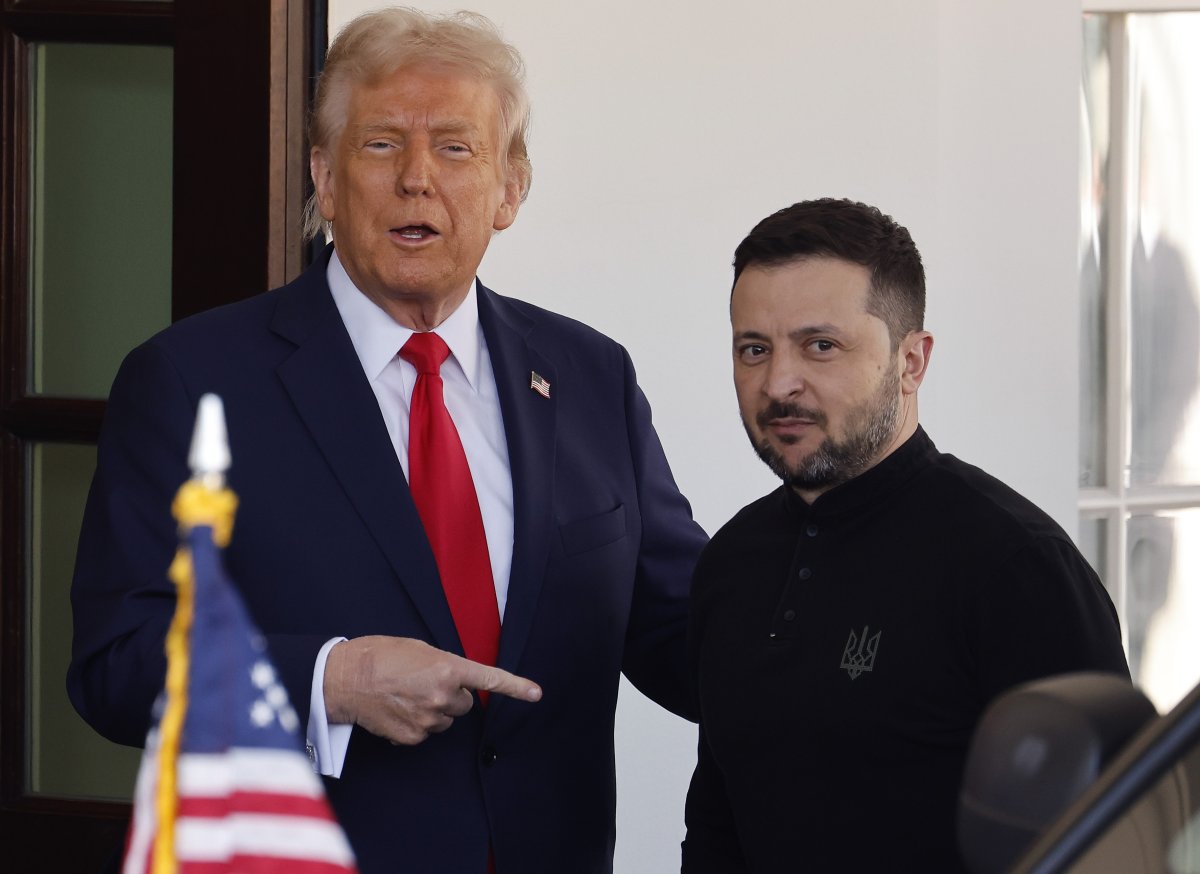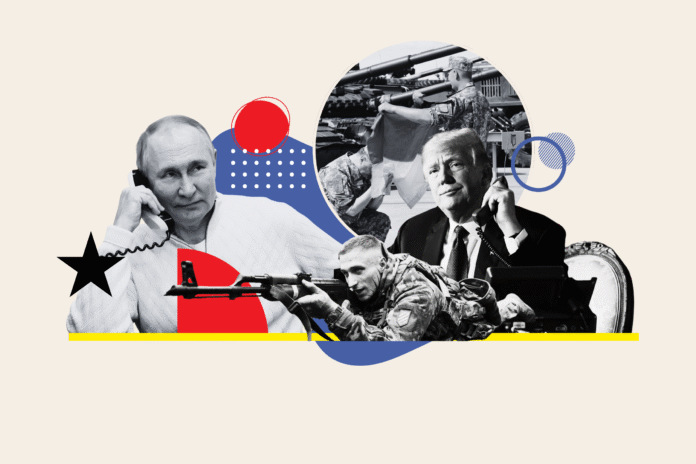Donald Trump’s pledge to send Kyiv more weapons days after the Pentagon had announced a pause of some U.S. arms shipments has raised questions about whether it signaled an apparent shift in his approach to the war in Ukraine that Russian President Vladimir Putin started.
The U.S. president said Monday that Washington would send more arms to Ukraine because “they have to be able to defend themselves” in the face of intensified Russian strikes.
But it follows the White House and the Department of Defense confirming a halt to some weapons shipments to Kyiv amid a capability review. This raised concerns over Trump’s commitment to Ukraine, following a pivot toward better ties with Moscow since he re-entered the White House.
One geopolitical expert told Newsweek that Trump’s comments are likely to stem from anger at the inability to resolve the war quickly. Another said Trump is countermanding the Pentagon, which had made a decision without presidential approval.
A Pentagon spokesman told Newsweek that the Department of Defense “is sending additional defensive weapons to Ukraine to ensure the Ukrainians can defend themselves while we work to secure a lasting peace.”

Why It Matters
Concerned about declining U.S. stockpiles, the Pentagon said it had paused some shipments of precision munitions to Ukraine, which included air defense missiles.
The White House confirmed the pause in shipments of key air defense and precision munitions, although Trump later denied this. This sparked fears that the Ukrainian population would be left vulnerable to Russian drone attacks, which have increased recently.
So after being criticized for being too soft on Putin, Trump is now expressing his unhappiness with the Russian leader—both for his refusal to accept a U.S.-proposed ceasefire and his increasing attacks on Ukrainian infrastructure. Pledging weapons for Ukraine’s fight appears to be the latest stage in this pivot.
What To Know
Sitting with a U.S. and Israeli delegation, Trump told reporters Monday he was “not happy” with Putin and that Washington would send more weapons to Ukraine because “they’re getting hit very hard now” following drone bombardments on its cities.
Trump also described battlefield losses and touted his credentials as a leader who can end wars.
This comes only days after a halt on some weapons to Ukraine was confirmed by both the White House and Pentagon, but denied by Trump.
Following a phone call between the two leaders on July 3, Trump had said he was disappointed in Putin for not making progress to end his full-scale invasion.

MIKHAIL KLIMENTYEV/Getty Images
Trump also spoke to Ukrainian President Volodymyr Zelensky on Friday in a phone call that both leaders praised.
Trump said he wanted to help Ukraine’s air defenses, but the U.S. had to pause the latest weapons shipment to review its own stockpiles, according to two sources briefed on the call, reported by Axios.
Trump has pledged to send 10 Patriot interceptors and find other means of supply, according to the Axios report.
Trump reiterated Monday he was unhappy with Putin for failing to cooperate with a Washington-proposed ceasefire ahead of talks for a longer-term peace and for stepping up drone attacks on Ukrainian infrastructure.
Peter Rough, the director of the Hudson Institute’s Center on Europe and Eurasia, said Trump’s comments were significant because he was countermanding the Department of Defense’s cut on the pipeline of weapons to Ukraine—including interceptors like Patriots and other systems—and restoring the supply of at least some of the weapons.
Rough told Newsweek this move does not reflect a strategic shift by the president, but rather is a procedural issue in which the Department of Defense, and one office in particular, took the decision seemingly without presidential approval, congressional notification, or interagency coordination.
“By all accounts, partners and allies weren’t briefed ahead of time either,” he said.
Chief Pentagon spokesman Sean Parnell said in a statement that at Trump’s direction, the Department of Defense is sending additional defensive weapons to Ukraine and that “the framework for POTUS to evaluate military shipments across the globe remains in effect and is integral to our America First defense priorities.”

Chip Somodevilla/Getty Images
Yuriy Boyechko, CEO and founder of Hope for Ukraine, which provides support for communities on the front line, told Newsweek the weapons pause before Trump’s call with Putin was “a deliberate step by the White House” to appease the Russian leader.
By stopping the weapons flow, Trump wanted to show Putin that the U.S. was ready to disarm Ukraine if he only agreed to a temporary ceasefire, Boyechko said. However, for the Russian leader, appeasements are seen as signs of weakness, which he will use to push harder against those he is negotiating with.
When Putin made clear Moscow was not going to stop until it accomplished its war goals, Trump took that as “disrespect from Putin,” which is why Trump said Ukraine must have defensive weapons, added Boyechko.
António Alvarenga, a professor of strategy at Nova School of Business & Economics, said Trump has reversed from his pro-Putin overtures earlier this year, which included phone calls and peace talks that downplayed Western military support.
The Trump-Putin relationship has cooled, and this shift may indicate that Trump has acknowledged negotiations alone will not deter Putin and that tangible military support is now seen as essential, he told Newsweek.
“While Trump’s typically transactional outlook may still apply, his focus on appearing a strong man who can steer any world leader in his direction is likely to have played a role in this decision,” Alvarenga said.
Vuk Vuksanovic, an associate at the London School of Economics’ think tank, LSE IDEAS, said Trump’s comments on Monday most likely stem from anger over the inability to resolve the Ukraine war swiftly, as he initially thought.
But Russia has expended too much effort, money and blood in the past three years to accept a mere ceasefire, and this has resulted “in a divide that cannot be bridged.”
What People Are Saying
President Donald Trump on Monday: “We are going to have to send more weapons to Ukraine. Defensive weapons, they have to defend themselves.”
Vuk Vuksanovic, an associate at the London School of Economics’ think tank, LSE IDEAS, told Newsweek that Trump’s statement “most likely stems from anger over the inability to resolve the Ukraine war swiftly as initially thought.”
Chief Pentagon spokesman Sean Parnell in a statement: “At President Trump’s direction, the Department of Defense is sending additional defensive weapons to Ukraine to ensure the Ukrainians can defend themselves while we work to secure a lasting peace and ensure the killing stops.
“Our framework for POTUS to evaluate military shipments across the globe remains in effect and is integral to our America First defense priorities.”
Peter Rough, director of the Hudson Institute’s Center on Europe and Eurasia, told Newsweek: “I don’t think this reflects a strategic shift by the president as much as it highlights a procedural issue.
“The DOD, and one office in particular, took this decision seemingly without presidential approval, congressional notification, or interagency coordination.
“It took President Trump six months of constant communication with Putin to realize that he is being played and no matter what concessions the White House is ready to make toward Russia, Putin is not ready to stop.”
What Happens Next
Trump and his team are said to be reluctant to part with many Patriot interceptors and want the European allies to contribute as well.
Vuksanovic said the question remains over how much weaponry the U.S. can provide Ukraine and what difference it would make.
Meanwhile, Ukraine will hope for more clarity on U.S. weapons when Zelensky and his aides meet in Rome this week with Trump’s envoy, Keith Kellogg.


























